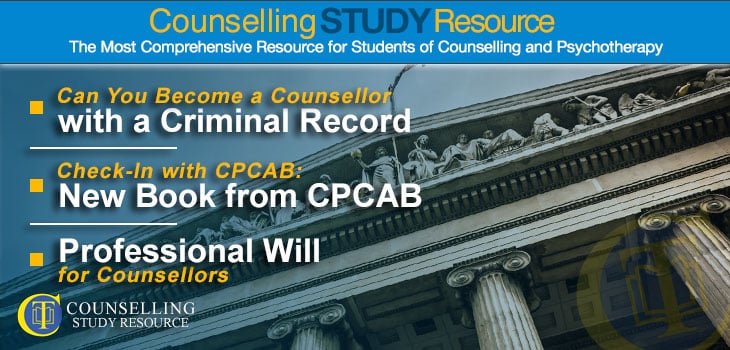133 - Can You Become a Counsellor with a Criminal Record?
Exciting New Book from CPCAB - Professional Wills
In episode 133 of the Counselling Tutor Podcast, Ken Kelly and Rory Lees-Oakes discuss if you can become a counsellor with a criminal record. In 'Check-In with CPCAB', there then follows an announcement about a new book that is about to be published, especially aimed at Level 4 students of counselling. Last, the presenters talk about professional wills: what these might cover and why they matter.
Can You Become a Counsellor with a Criminal Record? (starts at 2.05 mins)
Is it possible to train as a counsellor if you have criminal convictions? The answer to this depends partly on the nature of the conviction.
For example, people who have been convicted of a 'Schedule One' offence (i.e. an offence against a child listed in Schedule One of the Children and Young Persons Act 1933) or of a violent crime are unlikely to be able to become counsellors. But many other types of convictions will not prevent you from doing so.
Aside from answering the question can you become a counsellor with a criminal record, Ken and Rory offer some tips on what to do if you have a criminal record and wish to train as a counsellor:
- Always be open about your past when asked about this - e.g. with tutors, placement providers, employers and the Disclosure and Barring Service. Having this be discovered later without you declaring it up-front is likely to lead to serious problems.
- Becoming a counsellor with a criminal record also entails talking to the tutor at the college you are planning to apply to, so you can check out their view on your eligibility. They may need to discuss this with the health and safety officer in their institution.
- Remember too that in becoming a practising counsellor, you will likely need to join a professional body, e.g. the British Association for Counselling and Psychotherapy or the National Counselling Society. Do check with them too whether your conviction will preclude you from becoming a member. Again, they might need to consult internally before giving you a firm decision.
- Once qualified, you may need to choose your employer carefully, as some may have specific rules on not employing people with particular types of criminal conviction.
Check-In with CPCAB: Exciting New Book from CPCAB (starts at 13.55 mins)
Tips on useful reading for students of counselling and psychotherapy are a common topic of conversation on the Counselling Tutor Facebook page.
One great new book that you might like to look out for is A Student's Guide to Therapeutic Counselling, published by Sage on 30 November 2019.
Rory talks to Kelly Budd (Head of Qualifications) - who co-authors the book with Sandra Mckeever, Traci Postings and Heather Price - about its contents.
Divided into three parts - training to be a counsellor, practice issues and professional issues - the book is aimed at level 4 students, though is also valuable to qualified counsellors, including those wishing to set up in private practice.
A previous book, Counselling Skills and Studies - also published by Sage, and written by Fiona Ballantine Dykes, Traci Postings, Barry Kopp and Anthony Crouch - was targeted at level 2 and 3 students.
The new book has a question-and-answer format that aims to be highly student-centred, answering all the questions you are likely to have at level 4 stage. All topics are mapped against CPCAB's seven helping and counselling processes.
For more information about CPCAB, please see its website. CPCAB is the UK's only awarding body run by counsellors for counsellors.
Professional Wills (starts at 26.00 mins)
Ken and Rory talk about professional wills - in other words, the arrangements you make and the instructions you leave so that another counsellor (often your clinical supervisor) can act to safely and confidentially wind up your practice if you suddenly become acutely ill or die.
Parts of this task might include:
- contacting clients
- handling client data
- paying any outstanding bills
- referring clients on
- informing your professional body
Rory has written a professional will grid. While this is not a legally prepared document, it can act as a template for you to use when considering what areas to cover in your professional will.
You might also like to check out what one of our partners, Private Practice Paperwork, has to offer - on their website, you'll find a Clinical Will Template to help you with this important task.


